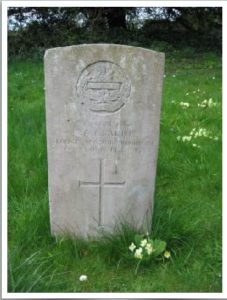3/4th Battalion, Gloucestershire Regiment

The majority of information regarding Ernest Robert Clarke has been gleaned from reports of his death and of the inquest, contained in the Gloucestershire Echo of 26 November 1915 and the Gloucester Chronicle and Gloucestershire Journal of 27 November 1915.
It is believed that he was born in 1871, possibly in Westbury-on-Trym, Bristol to Joseph and his wife Fanny Clarke (but this is not certain). He evidently married a woman called Annie Maria but details or where nd when have yet to be ascertained. According to the above newspaper reports Clark was an Army Pensioner, having served in the Royal Garrison Artillery. He either volunteered or was recalled from the Reserve to join the 3/4th Battalion,Gloucestershire Regiment (a Territorial Force unit)on 10 May 1915, possibly soon after its formation.
Given his age and previous military experience he was probably marked down for NCO rank and would have been useful as a trainer of new recruits.
The battalion was stationed in Cheltenham in late October 1915 and Ernest’s wife, Annie Maria, was living at Clifton Down Road, Bristol when he turned up to visit her for two days. She believed him to have leave of absence but later learnt that he was absent without leave. She stated at the inquest that he was a good husband and they had always lived on the best of terms. He had on occasion complained of a pain in the head and, when last home, of feeling unwell but she had no reason to think he would take his own life.
Serjeant Major Gatrell, of 3/4th Glosters stated at inquest that he had known Clarke since June 1915 and he considered him a good NCO, whose general character was also good. On 8 November 1915 he had gone absent without leave and on 11 November had been arrested in Bristol and returned to Cheltenham under military escort. On Friday 12 November he received a severe reprimand from the Commanding Officer of the battalion. The next day Clarke was seen by Gatrell and encouraged to improve his behaviour.
Clarke returned to his billet at Rose Cottage, Croft Street, Cheltenham to change his boots and disappeared. On the following Monday (15th) he was reported as absent without leave and no one knew of his whereabouts.
Sergeant Major Gatrell stated that when the battalion had moved to Malvern, Clarke had been led astray by another Corporal and taken to drink. (the other corporal had since been demoted) The suspicion of his being led astray was echoed by his wife Annie Maria Clarke.
Clarke was missing from Saturday 13 November until Wednesday 24th November when his body was discovered under a straw rick at Pincott Farm (just west of the Brockworth to Painswick road), by tenant farmer Henry Trinder Millard. The body was clothed but minus hat and boots, with an overcoat wrapped around the legs. The police were contacted and they arrived in the company of Dr William Robertson of Painswick. It appeared that the body had been under the rick for some days and exposure was the likely cause of death.
A post mortem revealed no evidence of violence or physical illness and that death had occurred at least eight hours before discovery. Some correspondence relating to military matters and letters from his wife were found on Clark’s person, plus a pencilled note to his wife which read:
“as I have lived, so I have died…game always” which apparently was a statement he often made to his wife, in a jocular way.
The verdict of the inquest was death from exposure and the circumstances as to how Corporal Clarke came to be under a straw rick at Upton St Leonards were never determined. Although found on 24 November 1915, his actual date of death is not known for certain.
He was buried in the churchyard of Upton St Leonards Parish Church, where a standard CWGC headstone marks his grave.
Researched by Graham Adams 9 April 2015
